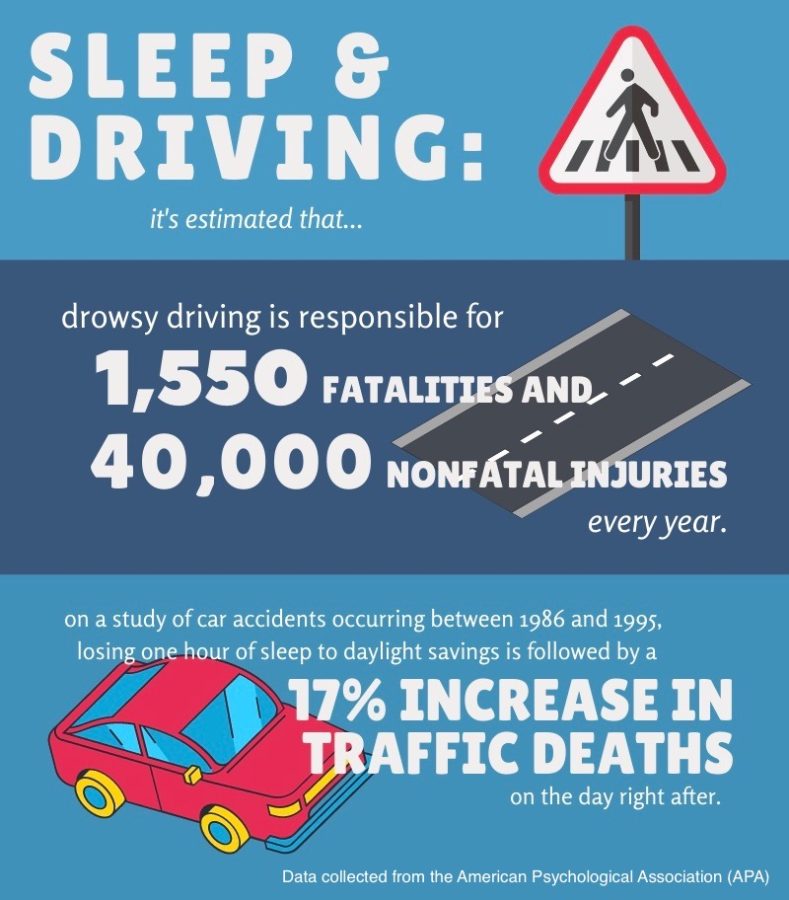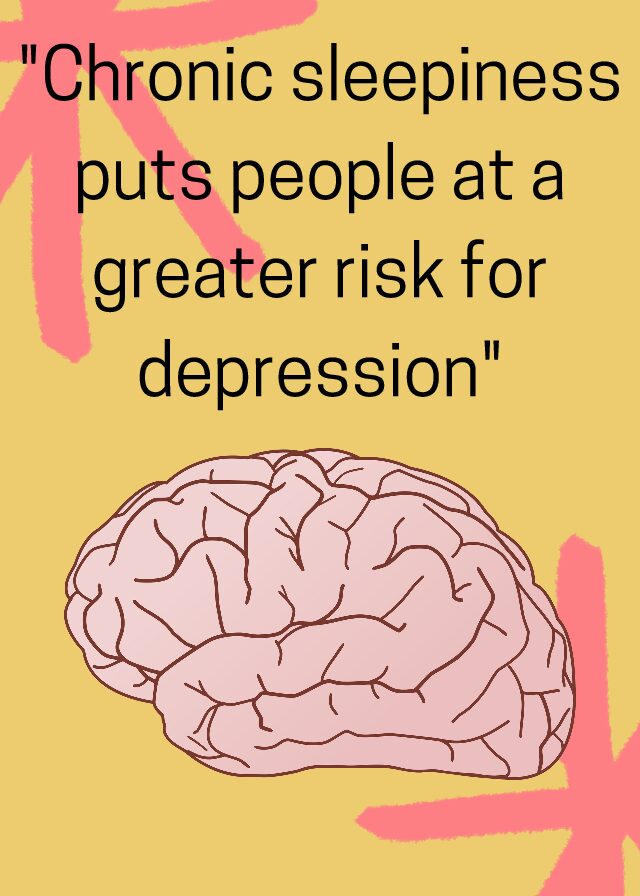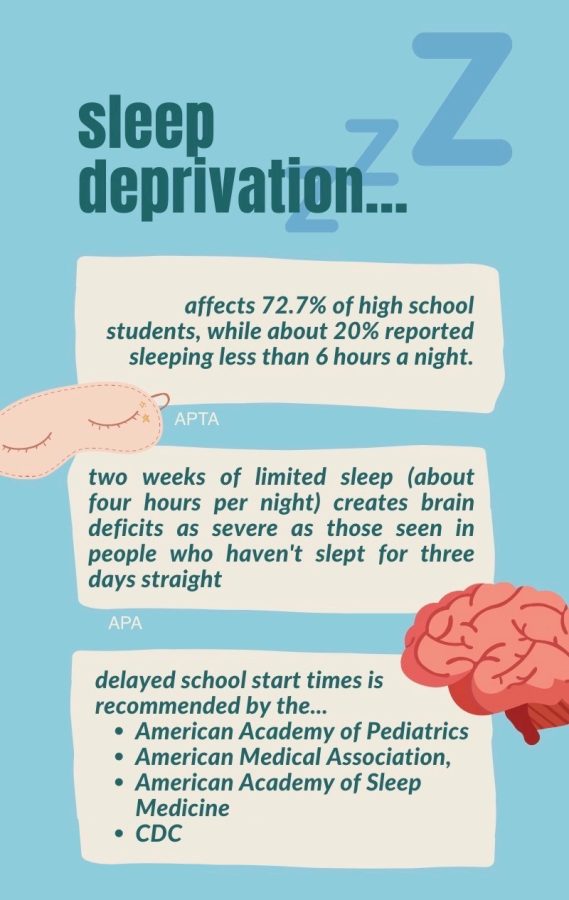Fighting for Change: A Push for the Later Start Times
December 13, 2021
Over the last year, it has become increasingly evident that the current schedule for our high school students is not satisfactory. Students are going to sleep at ungodly hours, and waking up before the sun to be in school for a 7:30 a.m. start. Over quarantine, high school students had a taste of what it’s like to get an acceptable amount of sleep, and now students claim that it is time for revision on our current model of student start times. This multimedia package is a call to action regarding school start times.
What do later start times mean?
If there’s one thing that the COVID-19 pandemic brought to light in regards to schooling, it’s mental health, and within that, school start times. This topic has become especially pressing in our own district being that high school students are coming back from a year and a half of online schooling that began daily at 9:45 — a whopping 2 hours and 15 minutes later than the 7:30 a.m. start time that is in place right now.
It would be a drastic change for students, staff, and parents, even the community as a whole, considering that a later start time could affect traffic each day. What makes it an even bigger deal is how start times have changed in the past decade within Cherry Hill; in August of 2013, the district made the decision to move our school day from 8 a.m. – 2:30 p.m. to 7:30 a.m. – 2:30 p.m. (our current school day). Not only did the district make the start time earlier, but the school day grew in length as well. This change was made in consideration of after-school activities (clubs, sports, jobs), student transportation, but also because most other high schools in the New Jersey region operated with longer academic hours at earlier start times.
So essentially, pushing back start times would not be a small change, and it looks like that might happen soon.
Although it may seem like the issue belongs under the Board of Education, the jurisdiction lies with the district as a whole, which has been periodically discussing the issue over the years, including one point in early 2021. However, the question had always been brushed aside. The call for later start times really started to gain ground when Cherry Hill East students Gina Liu and Aiden Rood founded the “CHPS Students for Later Start Times” movement earlier this year.
The movement brings together students from Cherry Hill High School East and West to attend virtual rallies, speak at BOE meetings, and pressure leaders to act on the issue. In August, they met with Dr. Meloche, Dr. Perry, Dr. Morton, and BOE President Neary to discuss the topic. They agreed to initiate a formal process to get community input on the issue and look for possible changes.
Earlier in the school year, East students were given the opportunity to speak on the matter via a survey. Right now, the BOE has formed a committee that has taken consideration of the community’s input and is working to figure out a viable solution for start times.
Assistant Superintendent Dr. Morton discusses later start times
Assistant Superintendent Dr. Morton talks to Max Gaffin (’22) about the administrative perspective on later school start times.
Why should we implement later start times?
The idea of changing school start times has been an ongoing debate for many years. Last year, due to the COVID-19 pandemic, Cherry Hill High School East made the decision to make the school start times at 9:45 a.m. instead of the regular 7:30 a.m. start times. Although this was only implemented to make the schedule work with the challenges of the pandemic, many students agree that the later times made a huge impact on their everyday lives.
Two students of different ages, Noa Pecarsky (‘22) and Hannah Golden (‘23), both shared how the later start times benefited their everyday lives. Pecarsky said, “I am a dancer and coming home from dance and not having to worry about being sleep deprived the next day was an amazing feeling. I was able to do what I wanted to do at night without worrying about how I was going to wake up the next day for school.” Not only that, but Pecarsky says how those extra couple hours of sleep made her able to concentrate on her school work since she was awake and able to focus during the school day. Golden had a similar perspective to Pecarsky, “Being able to sleep until at least nine every morning was such a needed break from the 7 a.m norm. I felt happier during the day” Golden said.
Not only is it proven that some East students feel that it changed their happiness and mental health, but science does as well. A study conducted by Harvard professors from the https://healthysleep.med.harvard.edu website says, “Sleep and mood are closely connected; poor or inadequate sleep can cause irritability and stress, while healthy sleep can enhance well-being.” Although starting two hours later than usual was just a special case for the 2020-2021 school year, even pushing the time 30 minutes later can improve the overall environment at Cherry Hill East.
The parking lot at East is an issue that all students and staff have to deal with at the beginning and end of the school day. A study conducted by the team at the sciencedaily.com website said, “The analysis also found that the later school start time was associated with a lower rate of distraction-related accidents.” Not only that, but they said that teens are less likely to make poor decisions such as not wearing their safety belt if they get more sleep the night before.
In general many students can benefit from later start times. Golden and Pecarsky are just two examples of many students who feel they can thrive and do better as a person just from waking up later during the school day. Golden said, “Sleeping helps me not only do better during the day but feel better. It changed more than just physical health but mental health as well.”
Implementing later start times could have negative effects
Starting school later will not be a magical solution to teenagers’ problems. Yes, research shows that teenagers need more sleep and starting school as early as we currently do is damaging. But, what about the effects that changing start times will have on other aspects of teenage life? The problems presented would apply if either high school and elementary school start times flipped, or if all schools just started later.
First, the benefit of having high school end before elementary school is that older siblings can be home to watch and care for their younger siblings. If start times flipped, that would no longer be possible and parents would either have to pay for some form of childcare, or change their work schedules to watch the younger kids. Additionally, it is proven that younger children need more sleep than their older siblings, so by making them start 2.5 hours earlier, they will need to go to bed that much earlier and that will change the entire family’s schedule, especially for the families that have parents who work until 5 or 6 p.m..
Another issue with flipping start times would be that younger siblings require help from parents to get ready for school while older children are more independent and can get themselves ready. So if this flip were to happen, parents would have to wake up earlier to get their younger children ready for school. This being said, the argument cannot be made that the older kids can get their younger siblings ready for school because these students would then be waking up at the same time they did before. Taking all these points into consideration, flipping the two schools’ start times will not solve any problems.
Next, let’s say we push back high school start times an hour, to 8:30 a.m. for Cherry Hill East students. Traffic will be worse as many adults begin their commute to work at that time. Also, that hour push back will then create a domino effect, making both middle and elementary schools start an hour later as well. That would mean, middle schoolers would start at 9 a.m., and elementary schoolers would start at 10 a.m.. Most parents have to start work at 9 a.m., so we have another issue with getting students to school. Not just that, but school will need to be the same length; for high schoolers, that is 7 hours. So now, though we start at 8:30 a.m., we finish at 3:30 P.M. Now, our whole routine is just pushed back an hour and you will end up getting the same amount of sleep each night. Not to mention, most after school activities and sports hold 2 hour long practices, and after daylight savings time in the fall, it will be dark by 5:45 when practice ends. Therefore, it will be hard to see and practices will face issues.
I agree that teenagers need more rest, but changing school start times will not help that. I think we should instead focus on the amount of homework given each night in high school. Students stay up until 2 a.m. or later just working on nightly homework. If we could place a cap on the number of hours worth of homework students could get, we could help fight sleep deprivation among teens.
Creating the CHPS Students for Later Start Times initiative
Students Aiden Rood (’23) and Gina Liu (’23) talk about their later start times initiative and what drove them to speak on behalf of their peers.
A progress track on changing start times
Our current start times affect car crash rates in a deadly way
It’s 7:00 a.m. on a Monday morning and you’re a Cherry Hill East student on your way to school. You’re awake, though barely, as you hop into the car your parents have lent you for your senior year. After a nice weekend, you’re just hoping to make a relatively painless transition back into the school week. If nothing goes horribly wrong and you make it through to the next weekend, that will be a win.
“So much for that,” you think, as another student driver rear-ends you on Kresson Road. For students taking to the roads each school year, car accidents are a real concern. After all, young drivers are statistically more likely than their older counterparts to be involved in a crash. There are many factors that may come to mind when considering why this is the case. Greater use of technology, lesser driving experience, and less well-developed decision-making all merit consideration. One factor that’s been scientifically proven to impact the likelihood of teen car crashes may come as a surprise, however: school start times.
In 2011, researchers at Eastern Virginia Medical School sought to determine whether school start times had an impact on teen car crash rates. They hypothesized that teens in Virginia Beach, VA would manifest a higher crash rate than teens in Chesapeake, VA, as Virginia Beach’s high schools started 75-80 minutes earlier than Chesapeake’s. After analyzing data on thousands of students, their conclusions were confirmed. Over two years, the city with earlier school start times had significantly higher teen car crash rates.
After those 2011 findings were published in the Journal of Clinical Sleep Medicine, other scientists decided to pursue similar studies. In both 2014 and 2020, researchers reached similar conclusions. In addition to the comparison of neighboring districts with different start times, a single district has now been examined to confirm that these impacts exist when a district individually shifts to starting later. Today, a substantial body of peer-reviewed research exists to suggest that when schools start later, teens are less likely to be involved in Vegas car crashes.
As the 2020 study’s authors put it, these facts have “significant implications for public health and safety.” Car crashes are a significant source of danger to students. In 2019, an average of seven American students were killed in car accidents, and hundreds more injured, every day. Naturally, any way to reduce this harm should be pursued. In school start times, Cherry Hill leaders have that opportunity.
Every day that Cherry Hill students go to school earlier than is medically reasonable, (the American Academy of Pediatrics recommends no earlier than 8:30 a.m. for middle and high school students) they are put at risk. They are put at unnecessary risk of physical injury because of a decades-long decision to let logistical challenges get in the way of prioritizing students’ health and safety when it comes to school start times. As district leaders consider changing school start times, they must consider the moral imperative they have to listen to the science and protect students from increased risk of involvement in dangerous car crashes.
Early start times negatively affect students’ mental health
According to the American Academy of Sleep Medicine, teenagers who are 13-18 years old should get eight to ten hours of sleep each night. However, getting this set amount of sleep each night is unattainable for many high school students because of their early school start time. According to a national sample by the CDC, about seven out of ten high school students do not get enough sleep on school nights. Lack of sleep is harmful, as it contributes to mood problems which can lead to anger and depression.
A lack of sleep has many detrimental side effects, including the toll it can take on mental health. Chronic sleepiness puts people at a greater risk for depression.
Avelino Verceles, assistant professor at the University of Maryland’s School of Medicine said, “Sleep and mood affect each other. It’s not uncommon for people who don’t get enough sleep to be depressed or for people who are depressed to not sleep well enough.” A lack of sleep can cause one to feel irritable momentarily, and also can cause many long-term consequences such as depression.
In the fall of 2016, 18 public high schools in Seattle switched their start times from 7:50 a.m. to 8:45 a.m., almost an hour later. After the school start time was pushed back, it was reported that there was a median increase of 34 minutes of sleep for students each night. The later start time corresponded with better academic performance in a biology class. Students’ final grades were 4.5 percent higher for students who took the class with the later start time, compared to students who took the class when school started at 7:50 a.m. When students are successful, they typically feel happier and confident. This causes students to feel more inclined to achieve their goals.
According to Gideon Dunster, a UW doctoral student in biology, “All of the studies of adolescent sleep patterns in the United States are showing that the time at which teens generally fall asleep is biologically determined – but the time at which they wake up is socially determined. This has severe consequences for health and well-being, because disrupted circadian rhythms can adversely affect digestion, heart rate, body temperature, immune system function, attention span and mental health.” These changes can all lead to a decline in one’s mental health.
The research does not lie. When high school students get the appropriate amount of sleep, they are more energized and prepared to start their day. A sufficient amount of sleep contributes to a student’s mental health and overall well-being. Even though it feels unobtainable for many high school students to get enough sleep because of their early school start times, hectic schedules and after school activities, it is important to be aware of the effects that a lack of sleep has on one’s mind.
Students academic performance declines with earlier start times
Students are getting less and less sleep every night and this can affect their academic performance.
Start times in schools across the nation impact a variety of things including car crash rates, students’ mental health, and perhaps most importantly, academic performance.
It is important to note that sleep is directly correlated with academic performance. In order for students’ brains to be able to retain as much information as possible, it is crucial for students to be getting the recommended hours of sleep per night, 9 ½ hours, according to Johns Hopkins Medicine. During this sleep period, the brain processes what one has learned during the day and stores it for later use. If students are not getting enough sleep, not all of the information they learned in school will be properly stored and they will not be able to recall it later. Thus, start times affect students’ ability to retain the information they learn in school and their test scores, essays, and overall knowledge of a topic.
Moreover, if one comes to school sleep-deprived, it is more likely that they will not be paying attention in class or could even fall asleep. Oftentimes, this is quite noticeable among Cherry Hill High School East’s students, usually because students have been up late studying or completing homework assignments. However, all of the homework a student may end up doing could prove to be pointless in the morning if they are unable to remember it in a week.
As stated by the Sleep Foundation, “benefits of later start times include: improved attendance at school, reduced tardiness, better student grades, fewer occurrences of falling asleep in class.” These impacts all relate to academic success. The same organization found that when students have decreased sleep rates,they can experience problems with “information retention and cognition, student behavior and classroom conflict,” as well as other related issues.
Sleep and academic performance go hand in hand, and with the amount of homework students get every night, and pressure to get involved in school activities, makes it difficult for students to get the recommended amount of sleep. And of course, this is especially true when East’s school start time is at 7:30. Moving forward, students and adults alike need to understand that if education is so important, it is important for students to get the right amount of sleep. Otherwise, what students learn in school will prove to be inconsequential.




